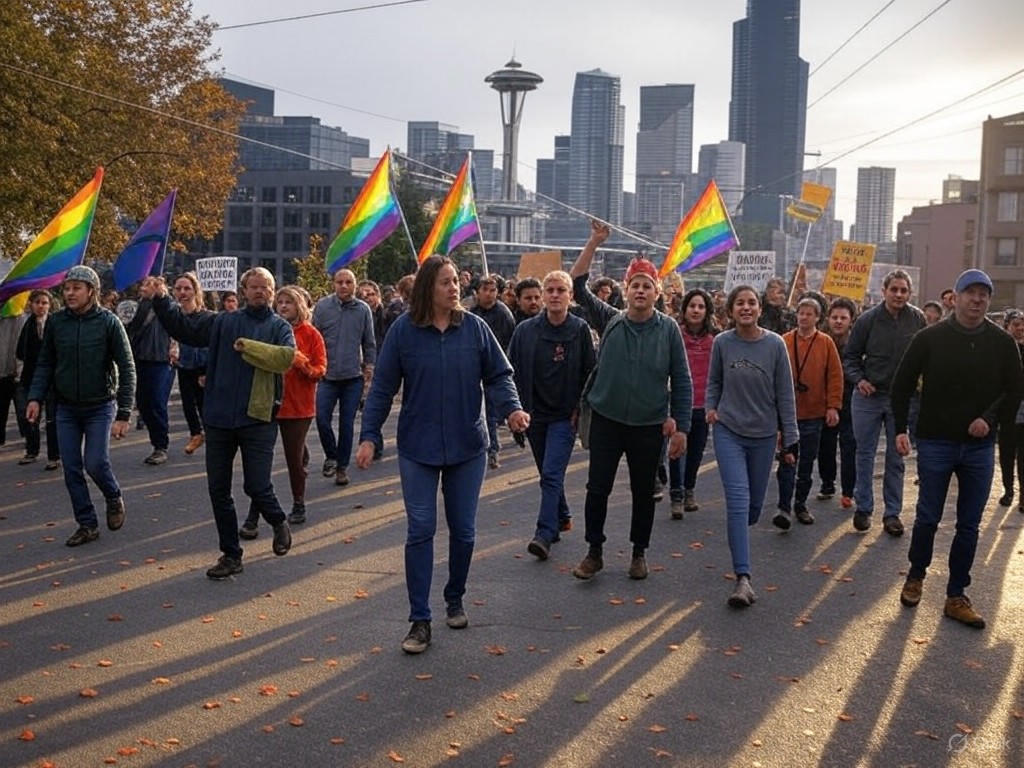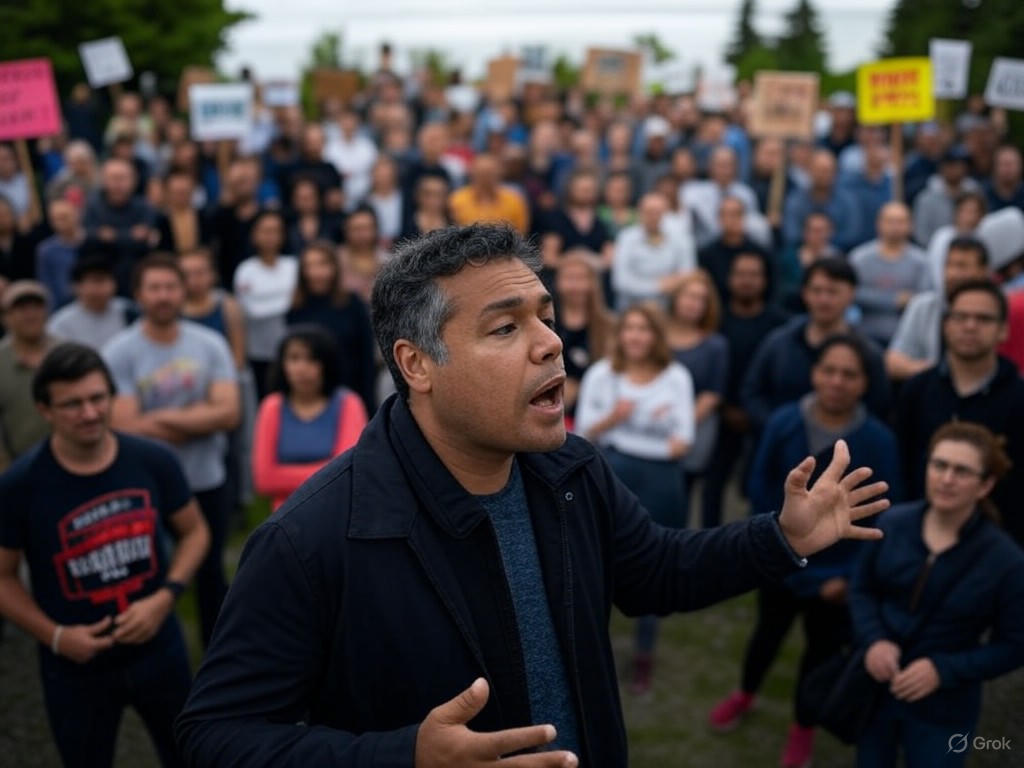Pacific Northwest’s Woke Culture: A Global Progressive Trend?
In the quiet expanse of the Pacific Northwest, where ancient forests whisper secrets to the sea, a subtle unrest stirs beneath the surface of society. This region, encompassing the rugged shores of Washington and Oregon, and the mountainous vistas of British Columbia, has long been a crucible for innovation and introspection. Yet, as global cultural shifts sweep across borders like autumn leaves in a gale, the progressive ideologies taking root here demand a measured gaze. These ideas, often characterized by an emphasis on woke culture, promise a reimagining of politics and society, but at what cost to the threads that bind communities? From a perspective that cherishes free markets, limited government, and the enduring strength of traditional values, this editorial explores how such shifts may erode the very cohesion that has sustained these lands, fostering division rather than unity.
The Pacific Northwest's embrace of progressive policies reflects a broader global phenomenon, where rapid social changes challenge established norms. In British Columbia, for instance, policies promoting environmental stewardship and social equity have gained traction, mirroring trends in neighboring states. However, when these initiatives expand unchecked, they risk prioritizing ideological purity over practical governance, potentially fragmenting the social fabric. As we delve deeper, it becomes evident that while innovation thrives in free markets, excessive government intervention can stifle the organic growth of communities, much like a vine overtaking a garden and choking its roots.
The Analysis: Ideological Currents and Their Undercurrents
The Pacific Northwest has become a emblematic theater for woke culture's ascent, where politics increasingly orbits around identity and regulation rather than shared endeavor. In cities like Seattle and Vancouver, British Columbia, progressive agendas have pushed for stringent environmental regulations and social programs that, while well-intentioned, often demand expansive government oversight. This mirrors a global trend where cultural shifts emphasize collective action over individual responsibility, yet such approaches can undermine the resilience born of personal initiative and market-driven solutions.
Consider the interplay between politics and society in this region. Woke culture, with its focus on scrutinizing historical inequities, has influenced local governance to adopt policies that prioritize diversity mandates and equity frameworks. In British Columbia, for example, provincial politics have seen a surge in initiatives aimed at addressing social disparities, often through government-led redistribution efforts. From a center-right lens, this raises concerns about the erosion of traditional values—those quiet virtues of self-reliance, community mutual aid, and fiscal prudence that have historically fostered stability. Free markets, after all, allow individuals to navigate life's complexities through innovation and voluntary exchange, rather than relying on bureaucratic edicts that may homogenize diverse perspectives.
Yet, the impact on community cohesion is profound. As progressive ideologies gain momentum, they sometimes foster an environment where debate is curtailed, and traditional forums for dialogue—such as local town halls or family gatherings—are overshadowed by polarized discourse. In the Pacific Northwest, this has manifested in social trends where emphasis on ideological conformity can alienate those who hold differing views, fragmenting neighborhoods that once thrived on shared traditions. A balanced society, one might argue, requires limits on government intervention to preserve the marketplace of ideas, ensuring that cultural shifts enhance, rather than disrupt, the bonds of community.

A gathering in Seattle's streets symbolizes the passionate debates over progressive ideologies, highlighting how such movements can both energize and divide local communities in the Pacific Northwest.
Evidence: Weaving Data into the Narrative
To substantiate these observations, one need only examine recent developments in the region. In Washington State, the implementation of progressive policies, such as aggressive zoning reforms and expanded social services, has coincided with reports of declining community engagement. A study from the Hoover Institution, a think tank advocating for limited government, notes that areas with heavy regulatory burdens often experience lower rates of civic participation, as residents feel disillusioned by top-down impositions Hoover Institution. Similarly, in British Columbia, data from the Fraser Institute, which promotes free-market principles, indicates that increased government spending on social programs has not always translated to stronger societal ties, with metrics showing a dip in volunteerism and local associations Fraser Institute.
These trends are not isolated; they echo global patterns. The Wall Street Journal has documented how woke culture's influence in politics can lead to what they term "echo chamber effects," where societal discourse becomes echoic, diminishing the pluralism essential for robust communities Wall Street Journal. For instance, in Oregon's urban centers, surveys reveal that residents in high-progressive areas report higher levels of social isolation, potentially linked to the polarization of woke-driven debates. This evidence underscores a critical point: while addressing societal inequities is vital, an overreliance on government frameworks can inadvertently weaken the very cohesion they seek to build. Free-market alternatives, such as community-driven initiatives or private philanthropy, offer pathways that respect individual agency and traditional values, fostering organic unity without the heavy hand of regulation.

Residents of Vancouver, British Columbia, come together at a local event, illustrating the potential for traditional values to bridge divides amid shifting cultural landscapes.
In contrast, examples from other regions provide a counterpoint. The American Enterprise Institute highlights how communities with less government intrusion and more emphasis on market freedoms tend to exhibit stronger interpersonal networks American Enterprise Institute. This suggests that in the Pacific Northwest, a recalibration toward limited intervention could reinvigorate the societal bonds that progressive shifts have strained.
Conclusion: A Call for Reflective Harmony
As the winds of global cultural shifts continue to blow through the Pacific Northwest, we are reminded of the quiet wisdom in Emily Dickinson's verse: "The Soul selects her own Society—Then—shuts the Door." Yet, in our modern era, true community cohesion demands an open door, one that welcomes dialogue without succumbing to the tempests of unchecked ideology. By advocating for free-market solutions and limited government, we can preserve the traditional values that have long anchored societies in British Columbia and beyond. Let us not forsake the market's invisible hand for the visible fist of regulation, but instead seek a balance that honors individual freedoms and fosters genuine unity.
In this reflection, the critique of progressive ideologies is not a dismissal, but a plea for introspection. As we navigate these changes, may we draw from the region's natural resilience—the steadfast mountains and flowing rivers—to build communities that endure, not divide. For in the end, it is the quiet strength of shared traditions that will guide us through the shifting tides.

